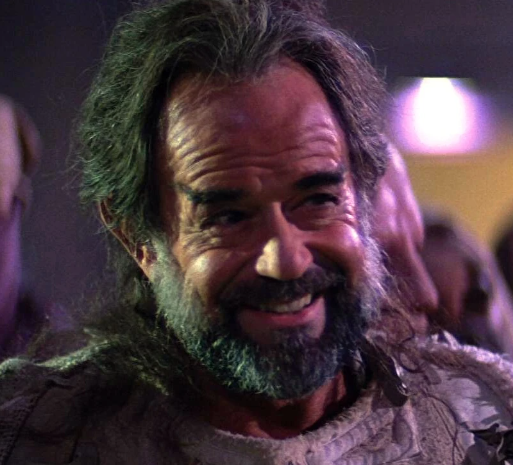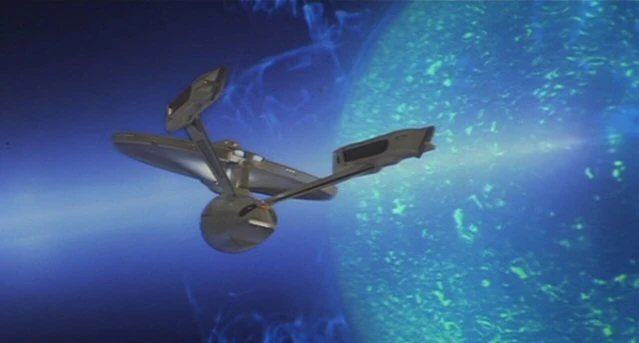During a recent interview with a Hollywood reporter to promote the release of his autobiographical documentary, William Shatner: You Can Call Me Bill, the 93-year-old Shatner reflected on how his inexperience as a film director led to a series of mistakes that in turn led to the commercial and artistic failure of Star Trek V: The Final Frontier.
In the interview, Shatner explained that.
I don’t think Shatner is right to shoulder as much blame as he does; I believe there is plenty of blame to share among others, especially the studio.
Was Shatner's concept strong enough?
Shatner is very clear that his idea for this movie was for the crew to search for God, and this was rooted in Shatner's opinion of American Televangelists, whom he saw as becoming incredibly wealthy from convincing others to believe they were speaking directly to God. Shatner once described them as “repulsive, strangely horrifying, and yet I became absolutely fascinated,"
This “in search of God” trope doesn’t seem out of place for a sci-fi film set in the future, where humans are exploring the galaxy and strange new worlds, cultures, and people. I believe the issue here was not Shatner; but the studio executives and the films Producer who decided to move beyond this initial theme.
Star Trek V was produced by renowned Star Trek legend Harve Bennett, who had been responsible for the three preceding films in the franchise. According to the book Star Trek Memories by Chris Kreski, Bennett disliked much of the original idea, finding issue with the fact that as there is no proof that God exists, the story would have to be left unresolved, as any resolution may offend both religious and non-religious audiences alike. Therefore, he was persuaded, along with the studio, to take the safer option: for the central being to turn out not to be God but rather an alien pretending to be the deity.
Shatner might well believe he wasn’t strong enough to resist Herve Bennett's adjustments, especially considering Bennett's long history as a Star Trek producer, creator Gene Roddenberry’s overall dislike of the concept, and Paramount's backing of the changes. Still, I don’t believe that’s all on Shatner. His initial idea and concept were sound and have been proven successful in other films after Star Trek V including Dogma, Bruce Almighty, and The Encounter. Shatner’s initial concept appears plenty strong enough to carry this movie; it was the risk-averse decisions of others that would push this concept into a muddy and unfinished middle ground.
The character of Sybok.

While Shatner doesn’t mention the casting as a failure, in my mind, the character design of the central character of Sybok would have serious ramifications on the film's eventual success. Initially, the alien “Televangelist” was to be a new alien called Zar – a religious fundamentalist and zealot. Over time, this character softened to elicit more sympathy from the audience. Eventually, Zar would become Sybok – a son born of Sarek and Spock's half-brother. Initially Sean Connery was sought to play the role, but he was unavailable due to commitments on Indiana Jones and the Last Crusade. Shatner stumbled upon Laurence Luckinbill, an American actor and playwright, to play the role. What should have been an overbearing, fundamentalist zealot, driven beyond any reason to seek his God beyond the barrier, became a strangely whimsical, very smiley, emotional Vulcan who could hypnotise people into following him through the medium of reliving painful or traumatic moments.
In my opinion, making Sybok a Vulcan was a mistake from the start. As an audience, we already knew much about Vulcans as a race from the established canon of the show and the films. Making them a key focus of this film whilst simultaneously undoing much of the established racial characteristics by introducing this new "Joker-esq" version of the species, with innate spiritual and emotional powers, didn’t make much sense, at least not to me. A much better option would have been an entirely new species of alien, which either was the Sybok character or was working behind the scenes to influence the will of another, more emotional, and easily corrupted species like humans, or Klingons.
Also, the revelation that this was Spock’s half-brother seemed unnecessary and once again placed too much weight on the Spock character, who had just been the focus of the previous two films. In any event, Sybok's "powers" didn’t rely upon him being related to an individual, therefore this just seemed an unnecessary and overly convoluted coincidence to make.
While I certainly wouldn’t criticise Luckinbill's acting skills, (he received very good reviews for this performance), I believe the character he was asked to play was seriously flawed. He was neither threatening nor endearing and seemed less focused on the deity, (as a devout Zealot would be) and more focused on the welfare of those immediately around him. So much so that when they arrive on the planet Sha Ka Ree (a play on the name Sean Connery), and the entity is unmasked, Sybok quickly forgets his beliefs, apologises for the mess he’s caused and sacrifices himself to give the crew time to escape. I’d argue that a more threatening portrayal of the character, right up to the bitter end, would have been better and provided a more satisfying storytelling device to carry the weight of this film.
Also, even though Shatner himself describes Sybok as a villain, he was certainly not portrayed in this way, which was a deliberate artistic choice. Heroes and villains are among the most powerful cinematic tools for directors, just think of Darth Vader or Captain America. In Star Trek V, the best credible villain we have is a character we don’t see for 95% of the film, who has barely 10 lines of script and is vanquished almost immediately upon discovery – all very unsatisfying really.
The special effects
In the interview, Shatner also admonishes himself over his inexperience with props, special effects etc, saying:
 Special effects are a big part of Star Trek, and that has always been true whether it was a Gorn suit in The Original Series or The Borg Queen in Picard Season 3. Sadly, for Shatner and his production team, there would be a problem using Industrial Light & Magic, which was the effects shop used for the three previous Star Trek films. ILM teams were already busy with Indiana Jones and the Last Crusade and Ghostbusters II, and the budget from Paramount wouldn’t have stretched to employing new teams within ILM. This left Shatner and the production team to rely on using a new company, Associates and Ferren, who had worked on films like Little Shop of Horrors and Altered States.
Special effects are a big part of Star Trek, and that has always been true whether it was a Gorn suit in The Original Series or The Borg Queen in Picard Season 3. Sadly, for Shatner and his production team, there would be a problem using Industrial Light & Magic, which was the effects shop used for the three previous Star Trek films. ILM teams were already busy with Indiana Jones and the Last Crusade and Ghostbusters II, and the budget from Paramount wouldn’t have stretched to employing new teams within ILM. This left Shatner and the production team to rely on using a new company, Associates and Ferren, who had worked on films like Little Shop of Horrors and Altered States. Whilst a very fine Special Effects shop with a good pedigree, they were entirely new to the Star Trek franchise; they would not only be expected to produce the new shots of Sha Ka Ree and the final climactic battle with God, but they would also have to support the special effects of more traditional and recognisable aspects of Star Trek. If we combine this franchise inexperience with a tight budget and an even tighter timescale to complete the work, the Special Effects for Star Trek V, a key part of the success of any Star Trek film, was severely compromised.
This was not of Shatner's making. Whilst he may well have visualised a very technically difficult climatic battle with multiple rock monsters attacking Kirk and the crew, the resources, time and expertise of ILM were not available to him, so we ended up instead with an "amorphous blob of light and energy" that groaned its way across the planet towards the Enterprise. When both Shatner and the production team saw the initial footage both were disappointed with the low quality of the shots, but with no support from Paramount, no new budget to fix the issues or time to get the work done, the final climatic battle was not reshot. It was just tweaked in post production to a close-up of the actor and some very heavy use of lightning effects.
Problems lie with Paramount.
Whilst it may be true that Shatner could accept some blame for not pushing back harder on Bennett’s stand against the concept, and true that his vision for the final battle was overly complex and not deliverable with the resources or time available. I think that Shatner is being far too hard on himself. In my opinion, the real issue with Star Trek V has to be Paramount itself.
It was Paramount that decided, along with Bennett, to weaken the initial story and vision for the film, fearful of potential backlash from religious audiences across America. It was Paramount that dictated the time available for filming and editing, and Paramount who determined that the film would Premier in the Summer of 1989 rather than the traditional Thanksgiving weekend. It was Paramount who failed to produce any real merchandise for the film, and Paramount who demanded the 2-hour original version be cut to 1 hour 45 minutes. Ultimately, it was Paramount who provided the budget of $33 million (admittedly double the budget used for Star Trek III) but refused additional funding to reshoot the climactic ending - which was to the be the centrepiece for the entire film.
Star Trek V: The Final Frontier grossed £63 million at the global box office; it would be nominated for six Razzie Awards, winning three including worst picture; and it would almost be responsible for cancelling Star Trek altogether. William Shatner for his part could certainly have done a better job, but he was always going to be limited by a studio who believed it was always right, and wasn't willing to spend the time or additional money necessary to make this film a success.
What did you think of this article? Do you think Shatner should take the blame for the films failings, or maybe it is your favourite Star Trek movie, tell us in the comments below.
WRITTEN BY WoorLord
EDITED BY WoorLord
IMAGES SOURCED FROM Memory-Alpha.com -Memory-Alpha.com - Memory-Beta.com


